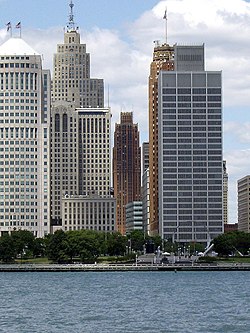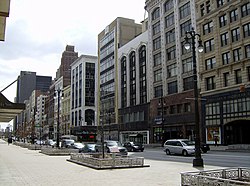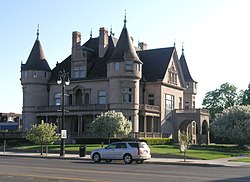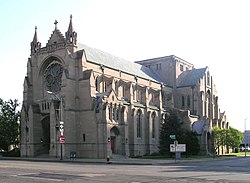- Detroit Financial District viewed from the International Riverfront.
- Historic Merchant's Row on Woodward between Campus Martius Park and Grand Circus Park in downtown Detroit, just south of the David Whitney Building.
- Fox Theatre lights up 'Foxtown' in downtown Detroit
- St. John's Episcopal Church
- Col. Frank J. Hecker House (1891), 5510 Woodward, designed by Louis Kamper after Château de Chenonceaux.
The list below shows the information on the buildings along Woodward Avenue in Detroit, Michigan. This list begins at Woodward's southern terminus at the Detroit River and proceeds north to the Detroit city limits at Eight Mile Road, also known as M-102.
Contents
| Address | Name | Use | Built | Style | Floors | Notes | |||
|---|---|---|---|---|---|---|---|---|---|
| West side of street | East side of street | ||||||||
| Detroit River/Hart Plaza contains Horace E. Dodge and Son Memorial Fountain, designed by Isamu Noguchi, and Noguchi's Pylon Tower | |||||||||
| Jefferson Avenue Joe Louis' Fist | |||||||||
| 1 Woodward Avenue | One Woodward Avenue | Office building | 1962 | Modern | 29 | designed by Yamasaki Associates, designers of the now-destroyed World Trade Center in New York City. Has 28 above-ground floors, one basement floor. | |||
| 2 Woodward Avenue | Coleman A. Young Municipal Center | City hall and courthouse | 1954 | International | 21 | 20 above-ground floors, one basement floor; Spirit of Detroit Sculpture at the entrance | |||
| Larned Street | |||||||||
| 500 Griswold Street | Guardian Building | Office building | 1929 | Art Deco | 40 | Known as the "Cathedral of Finance" | |||
| 500 Woodward Avenue | One Detroit Center | Office building | 1993 | Gothic Revival, postmodern | 45 | 43 above-ground floors, two basement floors; one of two planned towers | |||
| 501 Woodward | Detroit Federal Savings and Loan Building | Office building | 1971 | Modern | 5 | Constructed on a lot "left-over" after Woodward was widened in the 1950s | |||
| Congress Street | |||||||||
| 600 Woodward Avenue | Vinton Building | Office building | 1916 | Neoclassical | 14 | 12 above-ground floors, two basement floors | |||
| 608 Woodward Avenue | Martin Limbach Hardware Store Building | retail/restaurant | 1877 | Victorian Commercial | 5 | ||||
| 611 Griswold Street | The Qube | Office building | 1959 | Modern | 14 | Previously the National Bank of Detroit Building, Bank One Tower and Chase Tower, but commonly called the "Cheese Grater Building" due to its appearance, stands at the location of Detroit's first skyscraper, the Hammond Building | |||
| 660 Woodward Avenue | First National Building | Office building | 1922 | Neoclassical | 28 | 26 above-ground floors, 2 below-ground floors | |||
| West Fort Street | Cadillac Square | |||||||||
| Campus Martius Park | |||||||||
| 777 Woodward Avenue | One Kennedy Square | Office building | 2006 | Modern | 13 | 10 above-ground floors, three below-ground floors | |||
| Michigan Avenue | Monroe Street | |||||||||
| One Campus Martius | Compuware World Headquarters | Office building | 2003 | Modern | 20 | 18 above-ground floors, two below-ground floors | |||
| 1001 Woodward Avenue | 1001 Woodward | Mixed-use skyscraper | 1965 | International | 25 | 23 above-ground floors, two mechanical floors, previously known as the First Federal Savings Building | |||
| 1075 Woodward Avenue | 1001 Woodward Parking Garage | Parking garage | 2006 | Modern | 12 | ||||
| Gratiot Avenue | State Street | |||||||||
| 1206 Woodward Avenue | Former site of J. L. Hudson Department Store and Addition | Office building, department store | 1923–1946 | Chicago School | 33 | 29 above-ground floors, four below-ground floors | |||
| Grand River Avenue | |||||||||
| 1403 Woodward Avenue | Elliott Building | Apartment building | 1894 | Renaissance Revival | 6 | The structure was originally built as a retail building | |||
| 1447 Woodward Avenue | Frank & Seder Building | Apartment building | 1881 | Chicago School | 6 | The building was the tallest in the state when built | |||
| Clifford Street | John R Street | |||||||||
| 1500 Woodward Avenue | Wright-Kay Building | mixed use | 1891 | Queen Anne | 6 | Originally known as the Schwankovsky Temple of Music; occupied 1920-78 by Wright-Kay Jewelers currently, a nightclub and residences | |||
| 1545 Woodward Avenue | Himelhoch Apartments | Apartment building | 1901 | Renaissance Revival | 8 | The structure was originally built as an office and retail building, the Washington Arcade, and was later leased to upscale women's department store Himelhoch's from 1923 to 1977 | |||
| 1553 Woodward Avenue | David Whitney Building | Residential/Hotel | 1915 | Renaissance revival | 19 | The building underwent a $92 million renovation between 2013 and 2014 | |||
| 10 Witherell Street | David Broderick Tower | Apartment building | 1928 | Chicago School, Beaux-Arts | 35 | 2 basement floors; converted to apartments in 2012 [1] | |||
| Park Avenue | Witherell Street | |||||||||
| Grand Circus Park contains the Thomas Edison Memorial Fountain, monuments to mayors William C. Maybury and Hazen S. Pingree and a fountain honoring Governor Russell Alger by Daniel Chester French. | |||||||||
| 1600-1601 Woodward Avenue | Grand Circus Park Garage | Parking garage | 1957 | unknown | -2 | The underground garage was built under the two portions of the park in 1957. [2] The eastern portion accommodates 250 cars and the western portion accommodates 540. [3] | |||
| Adams Street | |||||||||
| 10 West Adams Street | Fyfe Building | Apartment Building | 1919 | Gothic Revival | 14 | Constructed as offices and retail; later converted to apartments with retail space at street level | |||
| 23 East Adams Street | Central United Methodist Church | Methodist Church | 1867, 1930 | Gothic Revival | 6 | ||||
| Elizabeth Street | |||||||||
| 2115 Woodward Avenue | The Fillmore Detroit (formerly State/Palms Theatre) / Palms Building | Theatre/Nightclub with Offices | 1925 | Gothic Revival | 12 | Building housing the theatre is named the Palms Building | |||
| 2125 Woodward Avenue | Little Caesars world headquarters expansion | Office Building | 2018 (est.) | Modern | 9 | ||||
| Columbia Street | |||||||||
| 2211 Woodward Avenue | Fox Theatre | Theatre and Offices | 1928 | Art Deco | 10 | Largest "Fox Theatre" in United States | |||
| Montcalm Street | |||||||||
| 2301 Woodward | City Theatre | Restaurant/Theatre | 2004 | Modern | 3 | ||||
| 2326 Woodward | St. John's Episcopal Church | Episcopal Church | 1861 | Gothic Revival | 3 | ||||
| Fisher Freeway (Interstate 75) | |||||||||
| 2645 Woodward | Little Caesars Arena | Arena and Offices | 2017 | Modern | 4 | ||||
| Unknown addresses | Brush Park | subdivision | 1800s | Victorian | NA | ||||
| 3424 Woodward | Bonstelle Theatre | Theatre | 1903 | Beaux-Arts, Neoclassical | Home of Temple Beth El until 1922 when the congregation moved to 8801 Woodward and the building was converted to a theatre; purchased by Wayne State University in 1956. | ||||
| 100 East Mack Avenue | Red Cross of Southeast Michigan | health center, offices | 1973 | Modern | 3 | ||||
| Martin Luther King, Jr. Boulevard | Mack Avenue | |||||||||
| 3501 Woodward Avenue | Orchestra Tower | Apartment building | Modern | 11 | |||||
| 3663 Woodward Avenue | Orchestra Place | Offices/Classrooms | 1997 | Modern | 5 | Part of the Orchestra Place Complex, which includes the 6-floor Detroit School of Arts. Houses offices for the University of Michigan Detroit Centre, Detroit Medical Centre, and Detroit School of Arts. | |||
| Parsons Street | |||||||||
| 3711 Woodward Avenue | Orchestra Hall (Max M. Fisher Music Center) | Concert hall | 1919, 2003 | Italianate, Modern | 4 | Home of the Detroit Symphony Orchestra | |||
| 3800 Woodward Avenue | Professional Plaza Tower | Apartment building | 1964–66 | International Style | 12 | Currently under renovation | |||
| Alexandrine Street | |||||||||
| 4 East Alexandrine | Bicentennial Tower | Apartment building | 1976 | Modern | 12 | ||||
| 3390 John R | Detroit Medical Center | Hospital Complex | 1921–1997 | various | >10 | Complex of six hospitals, affiliated clinics, partner institutions and Wayne State University Medical School | |||
| 4126 Woodward | Majestic Theatre | Theatre, Bowling Lanes, restaurant | 1915, 1934 | Art Deco | 3 | ||||
| Canfield Street | |||||||||
| 4221 Woodward Avenue | David Whitney House | restaurant | 1894 | Romanesque Revival | 3 | Constructed as a residence, previously housed offices, converted to a restaurant in 1986 | |||
| 4501 Woodward Avenue | Studio 1 Apartments | apartment building | 2007 | modern | 5 | Constructed in partnership with Wayne State University; features one and two bedroom apartments on the upper floors with retail at street level [4] | |||
| 4612 Woodward Avenue | Edwin S. George Building | apartment building | 1908, 1914 | 5 | The structure was renamed the Garfield Building in 1914 | ||||
| Forest Avenue | |||||||||
| 33 East Forest | First Congregational Church | Congregational church | 1891 | Romanesque Revival/Byzantine | |||||
| Hancock Street | |||||||||
| 4800 Woodward | Cathedral Church of St. Paul | Episcopal church, school | 1905, 1951 | Gothic Revival | |||||
| Warren Avenue | |||||||||
| 100 East Farnsworth | Rackham Memorial Building | University classrooms and offices | 1938 | Art Deco | 3 | Home of the University of Michigan Horace H. Rackham School of Graduate Studies | |||
| 5035 Woodward Avenue | Samuel L. Smith House | Offices | 1889 | Queen Anne | 4 | Part of Wayne State University | |||
| 5057 Woodward Avenue | Maccabees Building | Offices, classrooms | 1927 | Art Deco, Romanesque Revival | 15 | Part of Wayne State University | |||
| 5200 Woodward Avenue | Detroit Institute of Arts | Art museum | 1927, 1966, 1971, 2007 | Beaux-Arts, Renaissance Revival | 5? | Second-largest municipally owned museum in the United States | |||
| 5201 Woodward Avenue | Detroit Public Library | Library | 1921, 1963 | Renaissance Revival, International | 5 | ||||
| Kirby Street | |||||||||
| 5401 Woodward Avenue | Detroit Historical Museum | museum | 1951 | International | 4 | Has two floors of galleries above ground and one below; the third floor houses administrative offices | |||
| 15 East Kirby Street | The Park Shelton | condominiums | 1926 | Chicago school, Italianate | 12 | Opened as a residential hotel; converted to apartments in the 1970s and to condominiums in 2004 | |||
| Ferry Street | |||||||||
| 5510 Woodward Avenue | Col. Frank J. Hecker House | offices | 1888 | French Châteauesque | 3 | Served as residence to the Hecker family until 1947 and a music store until 1990, restored and converted to offices in 1990 | |||
| 71 East Ferry Avenue | Charles Lang Freer House | offices | 1887 | Queen Anne Shingle Style | 3 | Freer was business partner of Frank Hecker; the structure originally housed the Peacock Room by James McNeill Whistler; Has housed offices for Merrill-Palmer Institute since 1923 | |||
| Edsel Ford Freeway (Interstate 94) | |||||||||
| 5930 Woodward Avenue | Our Lady of the Rosary Church | Roman Catholic Church | 1896, 1907 | Romanesque Revival | 2 | Constructed as St. Joseph's Episcopal Church in 1896 and purchased by a Catholic congregation in 1907 | |||
| 11 West Baltimore Avenue | Detroit Amtrak station | Train station | 1988 | ||||||
| Grand Boulevard Site of first traffic light in Michigan | |||||||||
| Chandler Street| Delaware Street | |||||||||
| 8000 Woodward Avenue | Metropolitan United Methodist Church | Church | 1926 | Gothic Revival | 7 (bell tower) | Houses the second largest pipe organ in Michigan | |||
| Philadelphia Street | |||||||||
| 8501 Woodward Avenue | Woodward Avenue Presbyterian Church | vacant | 1911 | Gothic Revival | |||||
| 8801 Woodward Avenue | Bethel Community Transformation Center | Church | 1921–1922 | Neoclassical | Home of congregation of Temple Beth El until 1974 | ||||
| Boston Boulevard | |||||||||
| 9944 Woodward Avenue | Cathedral of the Most Blessed Sacrament | church | 1913–1951 | Gothic Revival | Sanctuary completed in 1930 and selected as cathedral in 1937; towers and facade completed in 1951 | ||||
| Davison Freeway (M-8) | |||||||||
| 91 Manchester Avenue | Highland Park Ford Plant | Automobile plant | 1908–1910 | Unknown (Industrial) | 4 | Currently stores documents and artifacts from the Henry Ford Museum, as the plant has not been in use since 1978 (activity shifted to the River Rouge Complex in the 1920s, trim activity continued until 1978) | |||
| West McNichols Road | |||||||||
| 19013 Woodward | Palmer Park | Park and Golf course | 1924 | Unknown | ? | U.S. Senator Thomas Witherell Palmer donated 140-acre (57 ha) to establish the park in 1893 that now encompasses 296-acre (120 ha) and houses a golf course, picnic areas, playgrounds, a log cabin and a fountain honoring local businessman Charles Merrill | |||
| West Seven Mile Road | |||||||||
| 19807 Woodward | Evergreen Cemetery | Cemetery | 1905 | Unknown | 2 (mausoleum) | ||||
| 19975 Woodward | Woodlawn Cemetery | Cemetery | 1895 | Gothic Revival | 2 (mausoleum) | ||||
| West State Fair Avenue | |||||||||
| 1120 West State Fair Avenue | Michigan State Fairgrounds Coliseum | Michigan State Fair fairgrounds | 1922 | Italianate | 3 | ||||
| West Eight Mile Road (M-102) | |||||||||

















